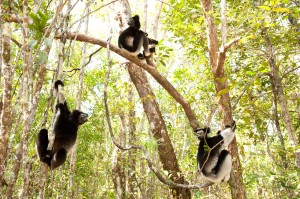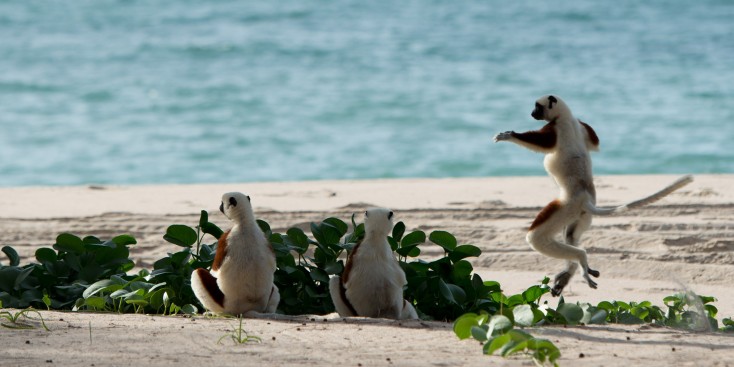
Indri lemurs are great leapers and can jump from tree to tree in the forest as seen in ISLAND OF LEMURS: MADAGASCAR. ©Warner Bros. Entertainment. CR: Drew Fellman.
By ANGELA DAWSON
Front Row Features
HOLLYWOOD—When it comes to voiceover narration, no actor comes as close to evoking just the right mix of authority, folksiness, clarity and intelligence than Academy Award winner Morgan Freeman. Indeed, the Memphis, Tenn. native’s acting career began four decades ago as the character of the Easy Reader on PBS’ “The Electric Company.” He has narrated dozens and dozens of scientific and educational TV programs as well as several documentary films and even video games, alongside his day job in front of the camera in a wide range of roles.
Perhaps the most notable nature documentary to which he has lent his voice is the 2005 feature “March of the Penguins,” which won an Academy Award and became a worldwide phenomenon. In 2011, Freeman served as narrator on the nature documentary “Born to Be Wild,” an American short film about the plight of orphaned orangutans and elephants. Written and produced by filmmaker Drew Fellman, the film earned a Genesis Award for best documentary feature by The Humane Society of the U.S. When Fellman and his “Born to Be Wild” cinematographer, David Douglas, asked Freeman if he would narrate a short documentary called “Island of Lemurs: Madagascar,” about the indigenous primate creatures of this African country, Freeman said yes. The film was shot in IMAX 3D, bringing the cute big-eyed animals up close and personal to audiences.
The 76-year-old actor shows little fear of the squirrel monkey-sized brown lemur when a trainer places it next to him before a roomful of reporters. He says he feels privileged to be part of a film project that aims to raise awareness about the species, which lives in the wild only on Madagascar. Hunters and deforestation of their natural habitat have nearly wiped out the animals, which have lived on Earth for millions of years and once thrived on Madagascar.
Although there are 103 different lemur species that roam Madagascar, 91 percent of them are either threatened with imminent extinction, critically endangered or simply endangered, according to Patricia Wright, a primatologist whose efforts to study and preserve the creatures for the past three decades is documented in the film.
With six feature films due out this year, including “The Lego Movie” and the upcoming “Transcendence” opposite Johnny Depp, Freeman explained why it’s important for him to make time to lend his voice to educational documentaries such as “Island of Lemurs: Madagascar.”
Q: What is it about these animals that endear them to you?
Freeman: I have a friend who has a place in the Caribbean who raises them. On a visit to his place a year ago, maybe more, I was introduced to them up close and personal because they’re obviously in a little bit of trouble, and he’s doing what he can to help rejuvenate the population. So I got a little bit of history about them but not nearly what I got doing this narration. They’re terrific little creatures.
Q: What is your main concern for these animals?
Freeman: There was a book called “Ishmael.” It’s a trilogy in which the author (Daniel Quinn) explains that we’re turning everything on this planet into food for humans. We’ll eat it and if we can’t eat it, we’ll kill it and take it’s place and move it out of the way. The amazing thing about Madagascar is that there were no humans when the lemurs got there, so they flourished, and life does without us.
Q: You’ve played God in movies before. Is your voice in this film supposed to represent the Almighty?
Freeman: No. I don’t know if that comes across to people. Wonderful, but no. I’m just a barefoot boy who made good.
Q: You’ve worked with these gentlemen previously. Did you already have an interest in lemurs or was it a coincidence that they said they were going to make this movie about lemurs and we want you to narrate the film?
Freeman: It’s just coincidental that we made this movie about lemurs in Madagascar and we would like to call upon you again to do the narration for us. We did very well with “Born to be Wild,” so if you are of a mind to do it, we’d be very happy to have you. It’s IMAX and Warner Bros, and all the people I like anyway, so I figured if we’re going to be doing something that might give some succor—a word that I would read but never say—but to give some attention and consideration to the other life forms on our planet. I’m happy to do it. It’s an obligation.
Q: What’s on your bucket list?
Freeman: I have a film company (called Revelations Entertainment) and I want to make a film that gets a best picture … from somebody.
Q: Does it help get these stories told when you attach yourself to them? Is it the gravitas you bring in telling these stories since “March of the Penguins?”
Freeman: Yes and no. If I don’t do it someone else will. And I’m a little reticent to say, “Just as well.” But there are a lot of us who do this kind of work and do it quite well. Yeah, it comes out as well as it does because I do it, but it could come out just as well I someone else did it.
Q: You’ve narrated many educational documentaries. What do you love about the art form of the documentary and the educational value of film and TV?
Freeman: The educational value is what comes first. I’ve always thought the most effective tools we have for disseminating information, i.e. education, is television and film. People are glued to television. Our children, we can’t get them out into the park. So we need to find the right stuff to present to them since they’re going to be watching television. I’ve said I have this belief in disseminating useful information concerning the planet and the diverse biology of it. So I’ve just sort of dedicated myself to be available for anything that helps that along. The art of documentaries—I don’t know anything about it. But if somebody wants to do one about a subject that I’m interested in then, yeah, I’m available.
Q: What is the process for you to do the narration? Do you watch the footage first?
Freeman: The process. Get the script. Read the script. Generally, there is footage I get to see so we know what we’re talking about. And then it’s just a matter of sitting down in front of the microphone and reading. You know I have these incredible pipes so it’s no big deal. Even so, you can’t take too much credit for someone’s writing. There is that to be considered always.
Q: If you weren’t acting, do you think you could find yourself working in the science field?
Freeman: You have to be left-brained to a certain extent to understand science. I can talk about it but I can’t do it. I was a B-student in math simply because my teachers liked me as an actor. It’s true. They said, “If you were really smart enough, you wouldn’t have made a B in my class so you get a B.” My math professor told me that. If I weren’t doing this, I’d have no clue because I have no other talent.
Q: Have you ever been to Madagascar?
Freeman: No, I haven’t. There are so many places I haven’t been to.
Q: What’s coming out next?
Freeman: “Transcendence.” I’ve got another movie coming up with Diane Keaton. It’s kind of a human interest/love story about an older couple and a weekend in their lives.





